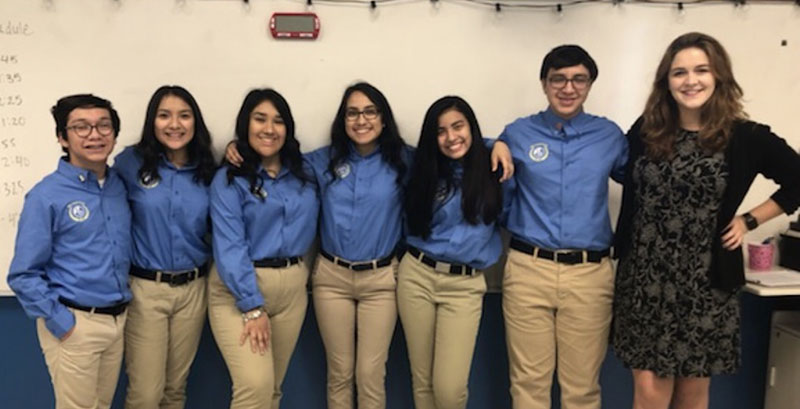An Educator’s View: My 12th-Graders Are Mostly First-Generation, Low-Income Students Hit Hard by COVID-19. 3 Ways Colleges Can Help Them

“We’ve been waiting for this moment for seven years,” lamented one of my seniors during a Zoom call in early April. She was mourning the loss of our annual College Signing Day ceremony, now indefinitely postponed. The Class of 2020 had been eagerly awaiting the day they would announce their college choices to a cheering crowd of thousands of family members, friends, teachers and younger students. Many of them will be the first in their families to announce their attendance at a four-year university.
But COVID-19 has made such gatherings impossible, at least in the traditional, confetti-from-the-ceiling sense. My students know that the decision to postpone these festivities puts public safety first, and they have handled this reality with remarkable grace — certainly more than I would have at 18. But now, the pandemic provokes another anxiety: that this year’s seniors may not make it to their first day of college this fall.
Since school buildings closed and unemployment began to skyrocket in mid-March, students have taken on essential roles in their families. This is particularly true for the majority of students I teach, most of whom are first-generation, low-income students. Many older siblings are now primary caregivers, cooking, cleaning and changing diapers to care for younger siblings while their parents work. Other students are picking up additional shifts at grocery stores and fast-food chains to bring in extra money for their families. These students often work late into the night after putting their siblings to bed or finishing their shifts to complete the final assignments of their senior year.
With graduating seniors taking on greater responsibilities in supporting their families through COVID-19, they will face unprecedented challenges as they transition to college in the fall. If these challenges are not addressed, many — particularly first-generation, low-income students — may not see through their matriculation commitment in August.
My seniors shared with me their greatest concerns about transitioning to college in the face of a pandemic. Here’s what colleges can do to address those concerns and ensure that my students have a fair shot at earning their degrees.
Support incoming students in revising financial aid applications and provide microgrants for urgent needs
The greatest concern my students shared was financial access to college. As colleges provide opportunities for students to revise their financial aid applications for the upcoming year — a commendable response to the current crisis — it is essential that they also provide active guidance to help incoming students to do this successfully. Many are struggling to navigate these new systems without support from teachers or guidance counselors. Every financial aid recipient should be personally contacted and supported to ensure that access is not dependent on knowledge of the system.
The financial barriers to college are not limited to the price of tuition. For some students, the difference between matriculating and not matriculating in the fall may be the cost of gas or the delivery fees for course supplies. Colleges should consider providing students with access to microgrants to assist with their most immediate needs.
Adopt and expand access to comprehensive case-management programs for first-generation, low-income students
While the spring semester is typically associated with senioritis, many of my students did not celebrate the cancellation of classes but rather expressed concern over lost instructional time. This cohort will likely enter college with academic gaps due to the limitations of distance learning. They will need opportunities to close them.
Instead of enrolling students in no-credit remedial courses, which would further drain their limited financial resources, colleges can emulate successful support programs like CUNY ASAP and Tarrant County Community College’s Stay the Course. These programs have increased completion rates for first-generation, low-income students using a comprehensive case-management approach that includes academic support, personalized advising, career counseling and financial assistance.
Build connections with incoming students and communicate about the resources available to them
“One of my biggest concerns, especially with rumors of online college classes in the fall, is not being able to develop relationships with my peers and staff,” said one of my seniors. Others worried about their ability to adapt to their new college’s academic systems and structures from their computer screens instead of on campus.
If colleges must start the fall semester virtually, they need to prioritize communication with incoming students, and they must explicitly encourage first-generation, low-income students to access available resources. Many of them struggle to leverage academic resources, such as office hours, in the traditional campus setting. A computer screen will only make self-advocacy more difficult. Colleges should communicate about available academic, socio-emotional and financial supports not only through a campus website but also through personal contact from advisers. Personal connections will make these resources real and accessible in ways that mass communication simply cannot.
For four years, my students have overcome incredible hurdles to complete their race to college. Now, at the finish line, at a time meant for celebration, they instead face an unusual final obstacle. It’s time for higher education to double down in its efforts to provide authentic support to first-generation low-income students. Now more than ever, colleges must ensure that for my students, the race doesn’t stop here.
Carlene Huard teaches International Baccalaureate mathematics at IDEA South Flores College Preparatory in San Antonio, Texas. In 2019, she was named her district’s Teacher of the Year.
Get stories like these delivered straight to your inbox. Sign up for The 74 Newsletter

;)
